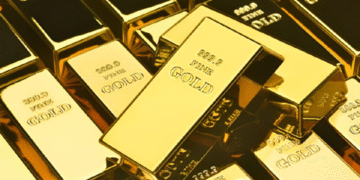With gold prices soaring over 25% in 2025, many organisations are replacing traditional gold medals with ₹1 lakh+ cash prizes, marking a major shift in award ceremonies amid skyrocketing costs
In a significant and symbolic transformation sweeping across India and several parts of the world, organizations and institutions are now opting for cash prizes over traditional gold medals to recognize excellence. This shift is being driven by an unprecedented 25% rise in gold prices in 2025, which has made awarding gold medals increasingly expensive and unsustainable.
From academic institutions and sports federations to corporate award ceremonies and civil honor events, the shift away from symbolic gold has become a defining economic trend of the year. In place of gold medals—once regarded as the ultimate emblem of success—awardees are now being handed cash cheques ranging from ₹1 lakh to ₹5 lakh or more.
As of July 2025, gold is trading at an all-time high, crossing the ₹75,000 per 10 grams mark in India. Globally, gold prices have breached $2,500 per ounce, fueled by:
- Geopolitical instability in West Asia and Eastern Europe
- Weakening global currencies
- High inflation and reduced interest rates in major economies
- Increased demand from central banks and retail investors
India, being the world’s second-largest consumer of gold, has felt the brunt of this surge more intensely. Cultural dependence on gold—especially in weddings, festivals, and awards—has made this price hike particularly disruptive.
For decades, gold medals were the hallmark of excellence in academia, sports, public service, and innovation. However, with rising costs, institutions are re-evaluating their sustainability.

✅ Examples of the Shift:
- National Science Awards 2025 – Traditionally offering 50g gold medals, the organizers this year awarded ₹2 lakh in cash per winner, citing rising costs.
- Inter-University Sports Championships – Switched from gold, silver, and bronze medals to tiered cash rewards: ₹1.5 lakh (first), ₹1 lakh (second), and ₹75,000 (third).
- Tech Innovators Summit 2025 – Introduced a new format: No medals, but ₹5 lakh to the winner and ₹1 lakh to each runner-up.
- State Government Civilian Awards in Maharashtra & Tamil Nadu – Moved from 20g gold medals to cash prizes ranging from ₹1 lakh to ₹3 lakh, plus certificates of recognition.
Dr. Ramesh Sethi, Economist at IIM Ahmedabad, explains:
“The symbolic value of a gold medal cannot be ignored, but inflation and market volatility demand flexibility. Institutions must now align their recognition systems with economic feasibility.”
Anjali Mehta, Cultural Historian, adds:
“In Indian culture, gold is linked with purity and permanence. But the current trend shows how practicality is reshaping tradition.”
Award organizers cite several reasons behind the shift from gold to cash:
- Cost Efficiency: A single 50g gold medal now costs over ₹3.5 lakh to manufacture and customize.
- Recipient Flexibility: Many recipients prefer monetary rewards to support education, innovation, or personal needs.
- Security Concerns: Storing and transporting real gold medals carries risks of theft or damage.
- Institutional Budgeting: Schools, colleges, and small-scale event organizers are increasingly under budget constraints and cannot justify gold expenditures.
For university toppers and national scholars, the shift has been bittersweet.
Riya Sharma, a gold medalist in Political Science from Delhi University, said:
“I got ₹1 lakh this year instead of a medal. I appreciate the support, but it feels like a legacy was lost. My parents were looking forward to seeing me wear a gold medal.”
Aditya Jain, an engineering student who won ₹1.25 lakh in lieu of a gold medal, said:
“Honestly, I’m happy with the money. I used it to pay part of my tuition loan. Medals can’t do that.”
While India has seen this transition at national and regional levels, the global stage—like the Olympics, Asian Games, and Commonwealth Games—has not yet adopted this change.
These events still use the traditional Gold Price-silver-bronze medal system, but experts suggest even international platforms might feel the pressure soon.
In fact, some whispers from inside the International Olympic Committee (IOC) suggest exploring plated medals with core cash rewards by the 2030s to offset rising costs.
Both government and private bodies have taken note of the changing dynamics:
- The Ministry of Education has proposed a new framework encouraging cash awards for academic excellence over material medals.
- Several corporate houses, including Infosys, TCS, and Reliance Foundation, have transitioned to giving cash vouchers and scholarships instead of commemorative gold items.
- Cultural organizations like the Sahitya Akademi and Sangeet Natak Akademi are also debating a similar shift.
The gold medal manufacturing industry, though niche, is facing a significant downturn.
Vikas Jewellers, a Mumbai-based firm specializing in award medals, has seen a 60% decline in institutional orders over the past year.

Vikas Patil, owner, said:
“Earlier we made 100+ medals per month for universities and sports federations. Now it’s barely 20. Most are opting for cheaper alternatives or only symbolic tokens.”
To survive, many such manufacturers are shifting focus to silver plating, brass medals, or pivoting to customized trophies and mementos.
The trend of replacing gold medals with cash awards seems poised to continue into 2026 and beyond, especially if gold prices remain volatile. As the world becomes more digitized, symbolic awards may gradually be replaced with tangible benefits—scholarships, grants, or startup funding.
However, cultural purists and historians caution against losing the sentimental and historical value of the gold medal, which has symbolized achievement for centuries.
| Aspect | Before (2022–2024) | Now (2025) |
|---|---|---|
| Gold Medal Cost | ₹2.3 lakh (for 50g) | ₹3.5+ lakh (25% hike) |
| Preferred Reward | Physical Gold Medal | ₹1 lakh+ Cash Prize |
| Common Sectors | Academia, Sports, Civil Awards | All above + Private Awards |
| Shift Drivers | Cost Efficiency, Flexibility, Inflation | Practical Need vs. Tradition |
| Emotional Value | High Sentimental Worth | Divided Opinion |















 Categories
Categories









